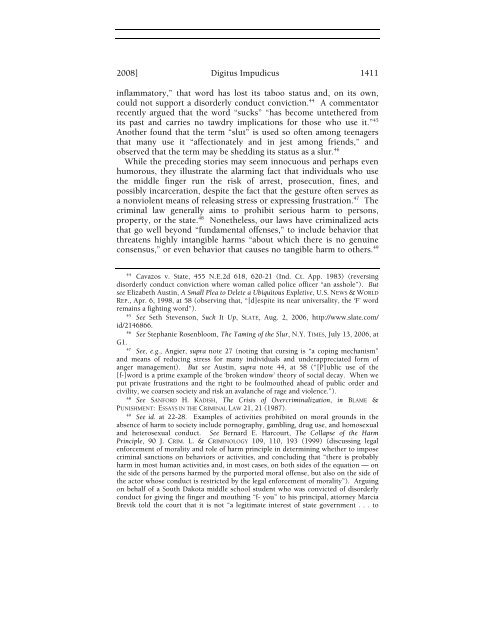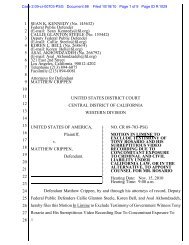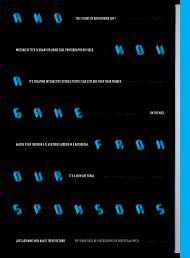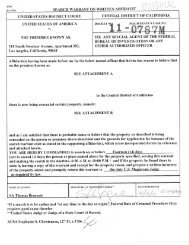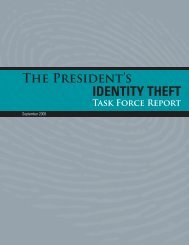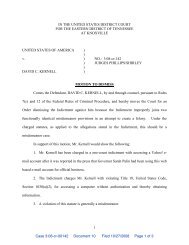Digitus Impudicus: The Middle Finger and the Law - Wired
Digitus Impudicus: The Middle Finger and the Law - Wired
Digitus Impudicus: The Middle Finger and the Law - Wired
You also want an ePaper? Increase the reach of your titles
YUMPU automatically turns print PDFs into web optimized ePapers that Google loves.
2008] <strong>Digitus</strong> <strong>Impudicus</strong> 1411<br />
inflammatory,” that word has lost its taboo status <strong>and</strong>, on its own,<br />
could not support a disorderly conduct conviction. 44 A commentator<br />
recently argued that <strong>the</strong> word “sucks” “has become unte<strong>the</strong>red from<br />
its past <strong>and</strong> carries no tawdry implications for those who use it.” 45<br />
Ano<strong>the</strong>r found that <strong>the</strong> term “slut” is used so often among teenagers<br />
that many use it “affectionately <strong>and</strong> in jest among friends,” <strong>and</strong><br />
observed that <strong>the</strong> term may be shedding its status as a slur. 46<br />
While <strong>the</strong> preceding stories may seem innocuous <strong>and</strong> perhaps even<br />
humorous, <strong>the</strong>y illustrate <strong>the</strong> alarming fact that individuals who use<br />
<strong>the</strong> middle finger run <strong>the</strong> risk of arrest, prosecution, fines, <strong>and</strong><br />
possibly incarceration, despite <strong>the</strong> fact that <strong>the</strong> gesture often serves as<br />
a nonviolent means of releasing stress or expressing frustration. 47 <strong>The</strong><br />
criminal law generally aims to prohibit serious harm to persons,<br />
property, or <strong>the</strong> state. 48 None<strong>the</strong>less, our laws have criminalized acts<br />
that go well beyond “fundamental offenses,” to include behavior that<br />
threatens highly intangible harms “about which <strong>the</strong>re is no genuine<br />
consensus,” or even behavior that causes no tangible harm to o<strong>the</strong>rs. 49<br />
44 Cavazos v. State, 455 N.E.2d 618, 620-21 (Ind. Ct. App. 1983) (reversing<br />
disorderly conduct conviction where woman called police officer “an asshole”). But<br />
see Elizabeth Austin, A Small Plea to Delete a Ubiquitous Expletive, U.S. NEWS & WORLD<br />
REP., Apr. 6, 1998, at 58 (observing that, “[d]espite its near universality, <strong>the</strong> ‘F’ word<br />
remains a fighting word”).<br />
45 See Seth Stevenson, Suck It Up, SLATE, Aug. 2, 2006, http://www.slate.com/<br />
id/2146866.<br />
46 See Stephanie Rosenbloom, <strong>The</strong> Taming of <strong>the</strong> Slur, N.Y. TIMES, July 13, 2006, at<br />
G1.<br />
47 See, e.g., Angier, supra note 27 (noting that cursing is “a coping mechanism”<br />
<strong>and</strong> means of reducing stress for many individuals <strong>and</strong> underappreciated form of<br />
anger management). But see Austin, supra note 44, at 58 (“[P]ublic use of <strong>the</strong><br />
[f-]word is a prime example of <strong>the</strong> ‘broken window’ <strong>the</strong>ory of social decay. When we<br />
put private frustrations <strong>and</strong> <strong>the</strong> right to be foulmou<strong>the</strong>d ahead of public order <strong>and</strong><br />
civility, we coarsen society <strong>and</strong> risk an avalanche of rage <strong>and</strong> violence.”).<br />
48 See SANFORD H. KADISH, <strong>The</strong> Crisis of Overcriminalization, in BLAME &<br />
PUNISHMENT: ESSAYS IN THE CRIMINAL LAW 21, 21 (1987).<br />
49 See id. at 22-28. Examples of activities prohibited on moral grounds in <strong>the</strong><br />
absence of harm to society include pornography, gambling, drug use, <strong>and</strong> homosexual<br />
<strong>and</strong> heterosexual conduct. See Bernard E. Harcourt, <strong>The</strong> Collapse of <strong>the</strong> Harm<br />
Principle, 90 J. CRIM. L. & CRIMINOLOGY 109, 110, 193 (1999) (discussing legal<br />
enforcement of morality <strong>and</strong> role of harm principle in determining whe<strong>the</strong>r to impose<br />
criminal sanctions on behaviors or activities, <strong>and</strong> concluding that “<strong>the</strong>re is probably<br />
harm in most human activities <strong>and</strong>, in most cases, on both sides of <strong>the</strong> equation — on<br />
<strong>the</strong> side of <strong>the</strong> persons harmed by <strong>the</strong> purported moral offense, but also on <strong>the</strong> side of<br />
<strong>the</strong> actor whose conduct is restricted by <strong>the</strong> legal enforcement of morality”). Arguing<br />
on behalf of a South Dakota middle school student who was convicted of disorderly<br />
conduct for giving <strong>the</strong> finger <strong>and</strong> mouthing “f- you” to his principal, attorney Marcia<br />
Brevik told <strong>the</strong> court that it is not “a legitimate interest of state government . . . to


